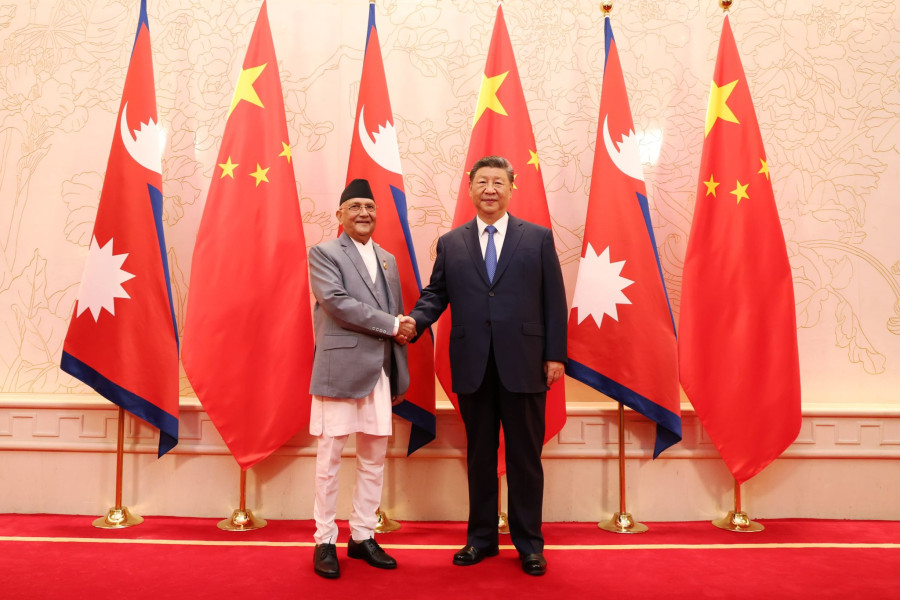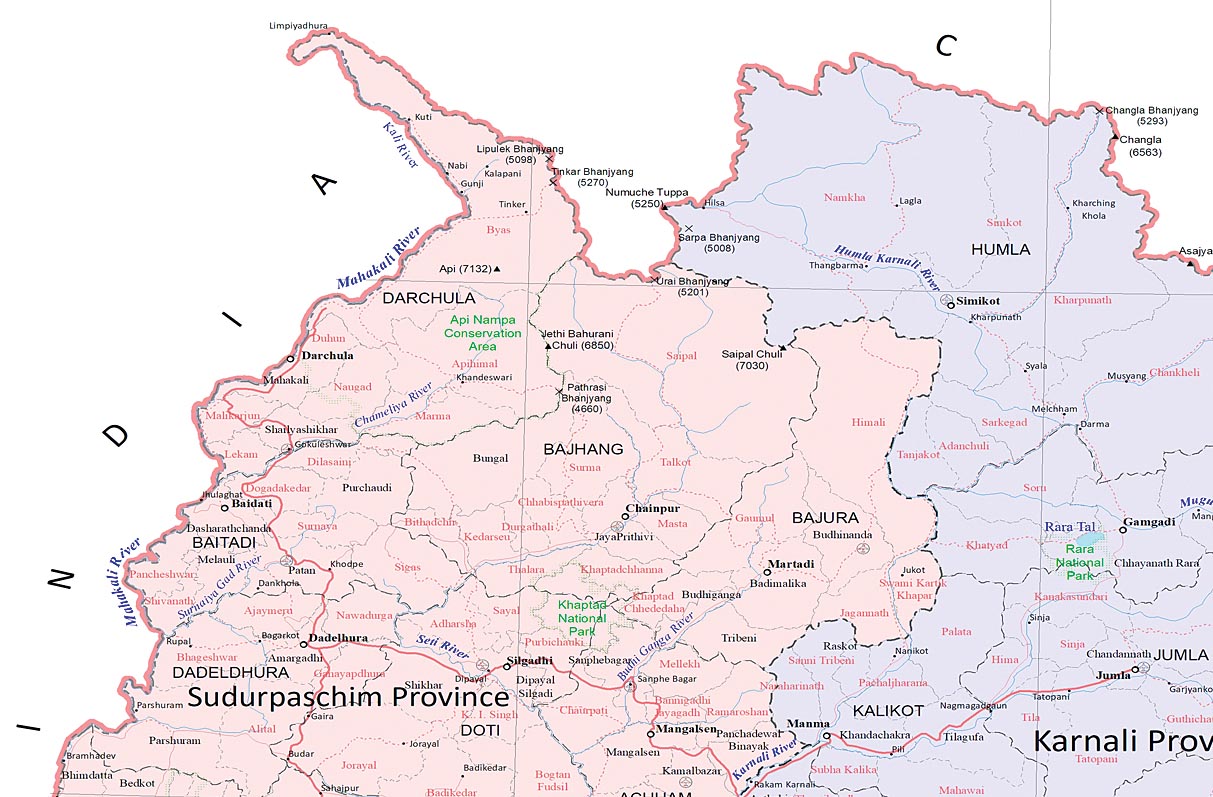National
In meeting with Xi, Oli objects to Lipulekh deal between India, China
Chinese President acknowledges Nepal’s concern but says it is a bilateral issue to be sorted out between Nepal and India.
Anil Giri
Prime Minister KP Sharma Oli on Saturday objected to the recent India-China understanding on the Lipulekh pass in a meeting with Chinese President Xi Jinping.
Oli, who reached the Chinese city of Tianjin the same day to attend the 25th Summit of the Shanghai Cooperation Organisation (SCO) and the SCO Plus meeting, held talks with Chinese President Xi at the Tianjin Guest House where he raised the issue of a recent understanding between Nepal’s two neighbours and urged Xi to recognise Lipulekh as part of the Nepali territory.
During the 24th round of the India-China Special Representatives’ dialogue on the boundary in New Delhi on August 20, India’s National Security Adviser Ajit Doval and China’s Foreign Minister Wang Yi agreed to reopen three traditional border trading routes, including the one that runs via the Lipulekh pass.
The Nepal government subsequently issued a statement objecting to the agreement and reaffirming that the official map of Nepal, as incorporated in the Constitution of Nepal, includes Limpiyadhura, Lipulekh, and Kalapani—located east of the Mahakali river—as integral parts of the Nepali territory.
At the bilateral meeting on Saturday, according to Foreign Secretary Amrit Bahadur Rai, the prime minister objected to the agreement between China and India to use the Nepali territory of Lipulekh as a trade route. Prime Minister Oli clearly expressed his objection with President Xi, said Rai. According to the Sugauli Treaty of 1816, all territories east of the Mahakali river belong to the sovereign nation of Nepal, Rai added. They are sovereign territory of Nepal, said Rai while quoting Oli, and there should be no agreement between India and China to use Lipulekh.
“We have serious reservations over that agreement, and the prime minister put forth our position in a clear way,” said Rai.
In response, Chinese President Xi told Oli that China has no objection over Nepal’s claim over that territory and urged Nepal to resolve the issue bilaterally with India, according to Rai. “That point [Lipulekh] has traditionally been used as a border point but we do not want to be a party to this dispute,” Xi told Oli. “We do not object to Nepal’s claim…but the issue should be resolved bilaterally.”
“During the one-on-one talks between our prime minister and Chinese president that lasted over 20 minutes, the issue of Lipulekh figured,” one Nepali participant at the meeting told the Post over the phone.
Oli stated that historical facts have established that Lipulekh is Nepali territory, and China should understand and support Nepal on this matter. The Chinese did not respond with what they would do but they took our concerns in a positive way, the participant said. “For the first time we registered our territorial claim with the highest authority of China.”
Nepal believes China will help Nepal in this matter, Rai said, quoting the prime minister. China should know about and understand the issue of Lipulekh pass, Oli reportedly told Xi. “Irrespective of one country’s size in terms of geography and population, all countries are equal in sovereignty.”
After listening to the prime minister, the Chinese president only nodded in response, according to one participant. The press note issued by the prime minister’s secretariat did not mention Xi’s response.
Referring to the recent understanding between India and China on border trade through Lipulekh pass, the prime minister stated that the territory belongs to Nepal and the government of Nepal has registered its strong objection on the same, said a statement issued by Nepali Embassy in Beijing.
Oli expressed hope on accelerating implementation of projects already agreed, including under the BRI, he requested support in such areas as fertiliser, petroleum exploration, human resources development, climate resilience and people-to-connection, according to the embassy’s statement.

Chinese President Xi expressed China’s willingness in helping Nepal fulfil its aspirations of ‘Prosperous Nepal, Happy Nepali’ and stated that China will cooperate with Nepal in multilateral forums like UN and SCO, said the statement.
Oli also requested the Chinese president to help with Nepal’s membership in the SCO. Nepal is a dialogue partner in the SCO and seeks the role of an observer.
“The president of China thanked Nepal for its strong adherence to one-China principle and reiterated China’s continued support in Nepal's development including through implementation of high-quality Belt and Initiative projects that have been agreed between the two countries,” said the statement.
A statement issued by the Chinese foreign ministry after the meeting between the two leaders did not mention Oli’s objection on Lipulekh, as communicated to Xi. Oli stated that Nepal-China relations have withstood various trials and tribulations and have grown stronger over time, according to the Chinese statement. The two sides have always respected and trusted each other, and cared for each other’s concerns.
“Cooperation with China has effectively promoted Nepal’s economic and social development. Nepal firmly adheres to the one-China principle, resolutely opposes Taiwan independence, and will not allow any force to use Nepali territory to harm China’s interests,” Oli told Xi, according to the Chinese foreign ministry.
Nepal is committed to continuous development and looks forward to deepening cooperation with China, jointly building the Belt and Road Initiative, and strengthening cooperation in areas such as trade, investment, agriculture, science and technology, tourism, and climate change response to achieve more positive results, Oli reportedly told Xi.
“Nepal supports the three major global initiatives [BRI, GSI, GDI] proposed by China, attaches importance to the role of the Shanghai Cooperation Organization, and actively practises the Shanghai Spirit. Nepal looks forward to China playing a greater role in international affairs,” the statement said further.
Oli reached Tianjin on Saturday, leading a Nepali delegation to the SCO Summit. Currently, China-Nepal cooperation on the Belt and Road Initiative is steadily advancing, and the two peoples are getting closer and closer, Xi reportedly told Oli. China is willing to work with Nepal to “carry forward our traditional friendship and promote new and greater development of the China-Nepal strategic cooperative partnership of everlasting friendship for development and prosperity”.
Xi also stressed that the two sides should enhance strategic mutual trust and firmly support each other on issues concerning each other’s core interests and major concerns, according to the Chinese statement.
“They should deepen mutually beneficial cooperation, jointly advance the Belt and Road Initiative, and strengthen connectivity in ports, highways, power grids, aviation, and communications. They should promote cooperation in industry, agriculture and animal husbandry, new energy, environmental protection, oil and gas, artificial intelligence, education, health, law enforcement, and security,” said the statement issued by the Chinese foreign ministry.
The neighbours should continue to successfully organise commemorative activities for the 70th anniversary of the establishment of diplomatic relations and they should strengthen communication and coordination in multilateral platforms such as the United Nations and the Shanghai Cooperation Organization, and jointly support free trade, sustainable development, and safeguard international fairness and justice.
Attending the meeting alongside Prime Minister Oli were Nepali Congress Vice-president Purna Bahadur Khadka; Education Minister Raghuji Pant; Minister for Culture, Tourism and Civil Aviation Badri Pandey; Yuba Raj Khatiwada, economic and development advisor to the prime minister; lawmaker Chhabilal Bishwakarma; Foreign Secretary Amrit Bahadur Rai; Nepal’s Ambassador to China Krishna Prasad Oli; and Joint-secretary Bhrigu Dhungana.
Cai Qi, secretary of the Communist Party of China, Chinese foreign minister Wang Yi and CPC party secretary of Tianjin Chen Min'er, among other senior Chinese leaders and officials, were present in the meeting from the Chinese side.
On Sunday, the prime minister and Nepali delegation will visit the Rice Core Planting Area, Huiguan Village, Tianjin and Zhou Enlai and Deng Yingchao Memorial Museum.
Later in the afternoon, the prime minister will hold bilateral meetings with Prime Minister of Vietnam Phạm Minh Chính, Maldivian President Mohamed Muizzu and will attend a welcome banquet and gala performance hosted by the Chinese President Xi.
Prime Minister Oli, however, is not meeting Indian Prime Minister Narendra Modi and Pakistani Prime Minister Shehbaz Sharif. Speaking in the House of Representatives on Friday, the prime minister gave details of his bilateral engagements during the SCO Summit and its sidelines where he is also meeting with Russian President Vladimir Putin.
According to the details provided by the prime minister to lawmakers, bilateral meetings had been confirmed with Russian President Putin, Maldivian President Mohamed Muizzu, Cambodian Prime Minister Samdech Moha Borvor Thipadei Hun Manet, Laotian Prime Minister Sonexay Siphandone, and Vietnamese Prime Minister Pham Minh Chính.
As the final event of the visit, alongside other world leaders, the Nepali delegation will participate on September 3 in the 80th anniversary event commemorating the victory of the Chinese armed resistance against Japan.




 9.12°C Kathmandu
9.12°C Kathmandu















